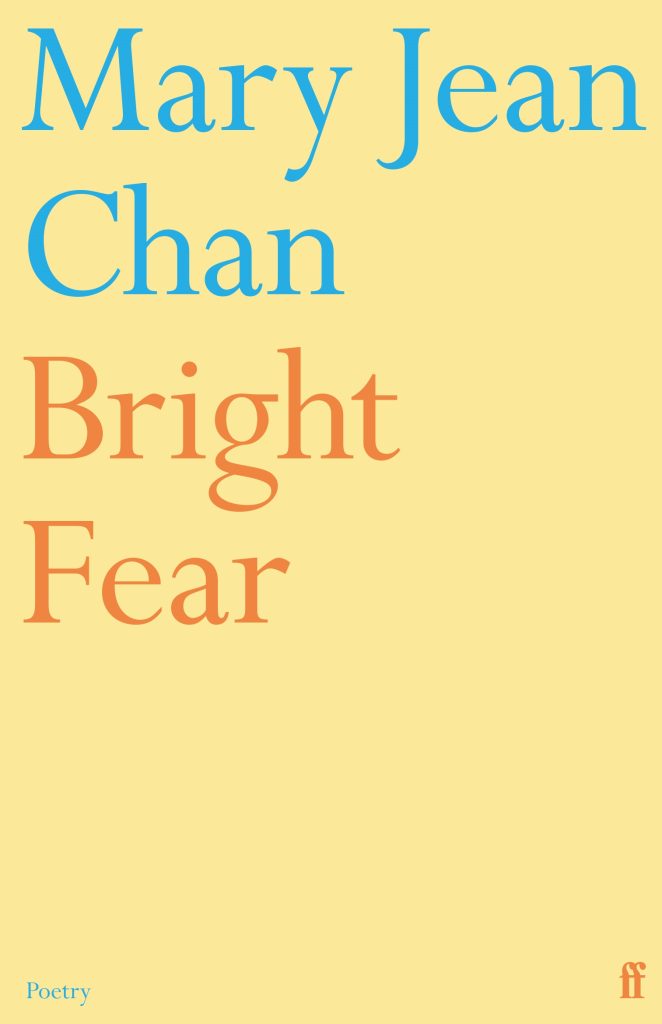Bright Fear (FORWARD PRIZE FOR BEST COLLECTION 2023, SHORTLISTED)
Mary Jean Chan
(Faber & Faber, 2023; pbk, £10.99)
The title of Mary Chan’s new poetry collection, Bright Fear, is intriguing. Fear is typically described as dark—even black—moods and colours that suggest negative qualities. In what sense is fear bright then? Well, we are taken on a journey of discovery in three distinctive sections: ‘Grief Lessons’, ‘Ars Poetica’ and ‘Field Notes on a Family’.
‘Grief Lessons’ begins with the SARS and COVID where to encounter other bodies is to risk contagion and death. In ‘Bright Fear’ and the prose poem, ‘London, 2020’, fear typecasts others as ‘potential hosts’ of disease, ‘repugnant’ repositories exhaling ‘unseen droplets, breath gently into air [that] could kill’. Masks, isolation and distance become a way to shield, to separate as well as to segregate; anxious rituals of cleaning only ‘allow once more for soiling’; the very air in the room bears the weight of ‘what has come before, its inward twist.’ These metaphors are revealing. Love and intimacy could kill but yet… oh yet… the pull of such desires remain strong in dreams—the room full of friends, holding someone close, the lover next to you.
Other poems shift sideways to tackle colonial legacies, as well as the contradictions of writing in English as a Hong Kong born Chinese. In the prose poem, ‘In the Beginning was the Word’, Chan writes her dilemma,
At times English feels like
the best kind of evening light. On other days, English becomes something
harder, like a white shield.
A cluster of poems such as ‘Answer’ and ‘EDI for Migrants’, ‘Sestina’ attest to how one introjects—takes from the public outside into the private inside—racial prejudice and the demand to assimilate. Being cast as different, being queer in a heteronormative world,
a body endures
the toll of
another glance.
No carapace exists to shield a vulnerable self from ostracision, invisibility, alienation and bewilderment.
The dream of the lost boy in the final section of ‘Field Notes on a Family’—to be the brother lost—is quietly heart-breaking in its rendering of mother-daughter intimacies, that ‘quotidian tug-/of-war between terror and love’ in ‘brother 1&2’ and ‘Calling Home’. In ‘Quiet’,
Wonder what songs are left
after the mothers have gone
to bed and the whole world
is lighter without their grief.
Resolution, albeit not closure, occurs towards the end of ‘Field Notes’, mother and child still speaking despite the audience’s applause to mark an end to proceedings.
Bright Fear reads like an astonishingly personal and intimate collection; that the writing is plain, direct, with few tricksy flourishes enhances this impression, and enables a intensity of tone and emotion. But beware of taking this as naive confession, for ‘Ars Poetica’ begins with
The poet opened a clean Word document, titled it POETRY, then saved it
in folder titled NONFICTION, then saved it in a folder titled FICTION.
The reminder is salutary. For ‘Ars Poetica’ draws the collection’s thematic threads together—cultural and sexual identity, language, belonging and unbelonging, translation as a bridge between states—through an attentiveness to poetry as words. Writing is both medium and message; the central poem ‘VIII’ of this section says it all:
Perhaps poetry is nothing
but a struggle to translate
the weight of flesh against
bone into syllables that
sound the shape
of things:
leaf
light
tree
sky
the fact of your face
beautiful like breath.
Reading this takes me back to Mark Doty’s equally marvellous poem, ‘Difference’, on the wonder of poetry as an expressive impulse to translate, words linking ‘what we know/to what we don’t/and so form a shape’. And the wordful goblet also points to the taking into the body of nourishment outside it.
Despite all the troubling encounters with others, the question Chan seems to pose is how not to shut down, to recoil, but instead manage an openness of orientation that is ultimately life-enhancing, ‘bright’ as it were. Here Chan’s sure handling of enjambment, evident in the poems throughout the collection, signals that very porousness. For therein the self – however quivering, tentative, and vulnerable – is thus open also to love and joy:
Each grief our bodies repositories
Of muscle and memory do not be
afraid let us speak ourselves into
splendour that is the joy I’m after[.]
Gail Low


Leave a Reply